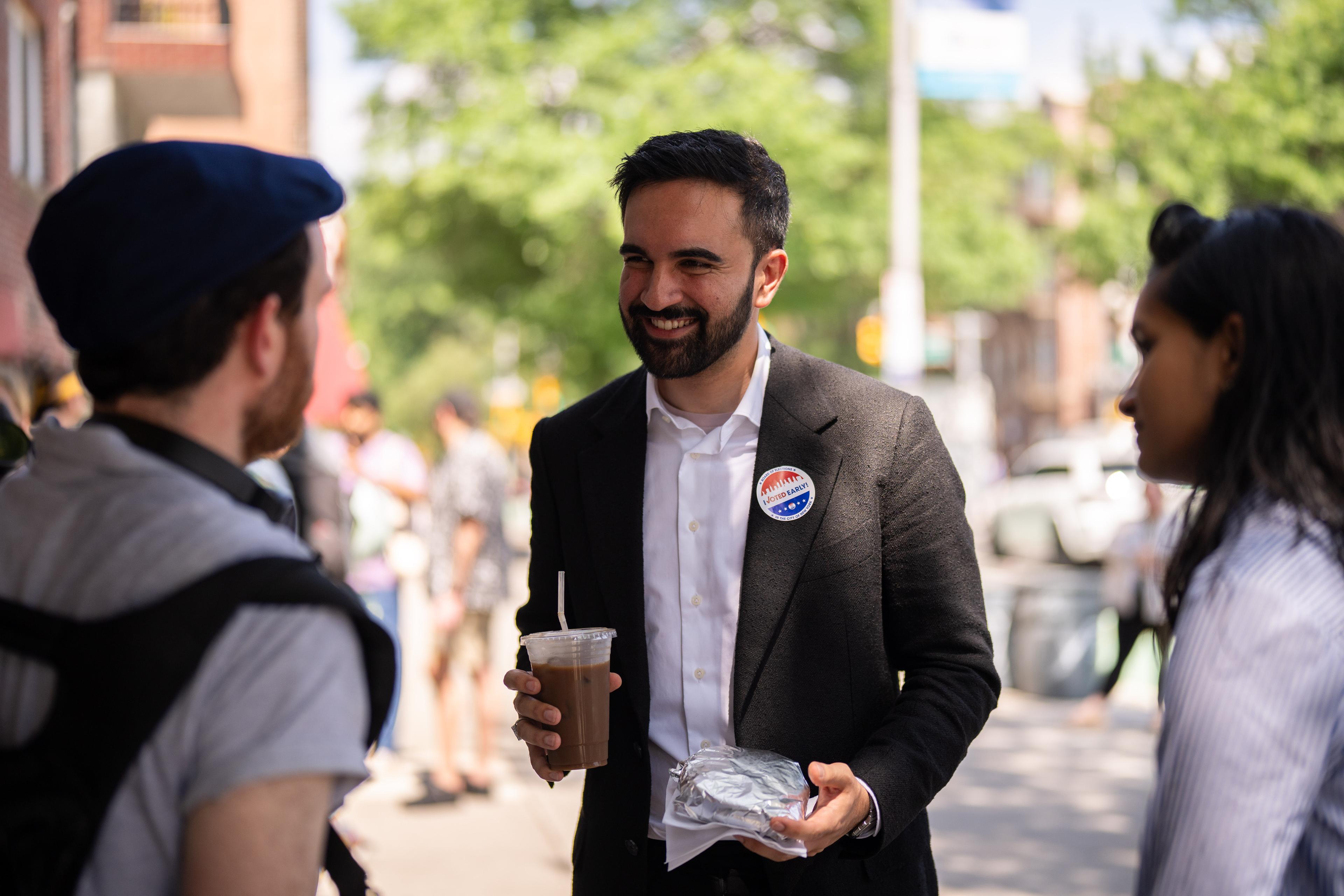
Plain English With Derek Thompson
NYC Mayoral Candidate Zohran Mamdani on Abundance, Socialism, and How to Change a Mind
Hosts
About the episode
Before today’s show, a personal announcement. After almost 17 years at The Atlantic, I have just officially moved my writing full time to Substack, the newsletter platform. If you like this show, if you’re a fan of my work, I think you’ll love what I’m trying to build. Sign up here.
Abundance, the book I cowrote with Ezra Klein, has received sharp pushback from left-wing commentators. But the response among left-wing politicians has been strikingly different. While Bernie Sanders devotees have repeatedly bashed the book, Representative Ro Khanna (D-California), an outspoken advocate of Bernie’s signature policy proposal, Medicare for All, has announced his support for abundance on several occasions. While several people have accused the book of ignoring policies to increase welfare, Wes Moore, the progressive Maryland governor whose private-sector career was devoted to reducing poverty, said in a recent speech that Democrats have to change from being the party of “no” and “slow” to the party of “yes” and “now.”
Then there is Zohran Mamdani, the Democratic Socialist candidate for mayor of New York City. Mamdani and I have very different politics on a range of issues: housing, affordability, education, levels of taxation, and spending. But Mamdani has in the past few weeks embraced what he calls an agenda of abundance. He’s told podcasts like Pod Save America that he thinks leftist critics of abundance have oversimplified the book and that our approach to making government work better is exactly what the left needs.
I saw some people point to Mamdani’s name-checks of Abundance and say, “This is great!” while others warned, “It’s a ruse! Stay away!” I wanted to talk to the man himself. So I was very gratified that Mamdani and I found 30 minutes to sit down Saturday and talk calmly about abundance and the left, how we agree, how we disagree, why government efficiency ought to be a virtue of all leaders (especially those on the left who want government to do much more), and, finally, how to change our minds. On this point, Mamdani and I are in full agreement: To see the errors in our own thinking requires that we have the courage to talk to people we do not agree with.
If you have questions, observations, or ideas for future episodes, email us at PlainEnglish@Spotify.com.
Summary
In the following excerpt, Zohran Mamdani shares his view on abundance with Derek and discusses how issues on a state scale have influenced that view.
Derek Thompson: You recently delivered a speech in which you said this: “Government must deliver an agenda of abundance that puts the interests of the 99 percent over the 1 percent.” Unsurprisingly, my ears pricked up at the language here. What does “an agenda of abundance” mean to Zohran Mamdani?
Zohran Mamdani: As someone who is very passionate about public goods, about public service, I think that we on the left have to be equally passionate about public excellence. And one of the most compelling things that I think Abundance has brought into the larger conversation is how we can make government more effective, how we can actually deliver on the very ideas that we are so passionate about, and a recognition of the fact that any example of public inefficiency is an opportunity for the argument to be made against the very existence of the public sector.
And so to truly make the case time and time again that local government has a role in providing that which is necessary to live a dignified life, you have to ensure that every example of government’s attempt to do so is one that is actually successful. And I think that’s what speaks to me about abundance. And I think that’s the line in the speech that speaks of both who we’re fighting for but also the fact that we’re delivering on that fight. And it’s one that is actually experienced each and every day by New Yorkers across the five boroughs.
Thompson: I think it’s really important that if we’re going to ask voters to give us the power to add new government functions, we have to prove that government can function in the first place.
Mamdani: Exactly, exactly.
Thompson: And reporting out this book with Ezra was really interesting. And, I’ll be honest, it’s sometimes almost black-pilling. It did not make me a libertarian. I’m still a proud liberal. I believe in an aggressive, muscular government. But it was astonishing sometimes to see that these examples of government failure were not exceptions to a rule but, in some cases, something tragically close to the rule itself.
And I wonder if you’ve had a similar experience of coming into government, coming closer to government functions, and recognizing that some things just don’t work the way they should. Can you put some meat on those bones of what you’ve seen that’s made you so passionate about not just announcing new public functions but proving public excellence?
Mamdani: I very much agree, and I think what’s been frustrating is that even the very language of this conversation, language around bureaucracy, efficiency, waste, even quality of life, we’ve allowed this language to be seen as if it is of a right-wing concern, when in fact this should be the most paramount left-wing concern, because it is either the fulfillment or the betrayal of that which motivates so much of our politics.
And one of my focuses in my time in the New York State Assembly has been on the MTA, in part because that is the form of government that most New Yorkers interact with most frequently on a daily basis. And when that train is late, when that bus is shown on your app to arrive in 10 minutes but never actually comes, when you are stuck in a tunnel, it diminishes your faith in local government at large. And I think this cannot be separated from the larger problem of politics in our city and in our state, which is that it has become more about incumbency protection than it has been about innovation and competence. And to be in a mayor’s race where my chief opponent is Andrew Cuomo, someone for whom his supposed strength is that of managerial competence, it is in stark contrast to his actual record in running so many parts of our state government that continue to be just as ineffective as they were when he became governor, if not more.
And the MTA is a chief example of that, where for years, he refused to even acknowledge that it was a state entity under his responsibility. And then it went to the point that he was so eager to chase the headlines of saving money on what was being spent on the MTA that he implemented a restructuring program within the authority that allowed for the elimination of positions as soon as someone would retire, without any actual comprehensive plan for ensuring that we were retaining the capacity within that authority to deliver on so much of what it was mandated to do—which then leaves us in a situation like the Second Avenue Subway, where in the first phase we’re spending more on consultants than we are on construction because we’ve lost so much of that internal capacity because we didn’t replace the people who retired or were fired or for whatever reason, because we were working backward from simply a headline of saying, “X amount of positions have been eliminated; Y amount of money has been saved.”
This excerpt has been edited and condensed.
Host: Derek Thompson
Guest: Zohran Mamdani
Producer: Devon Baroldi
